Times Change, No. 10
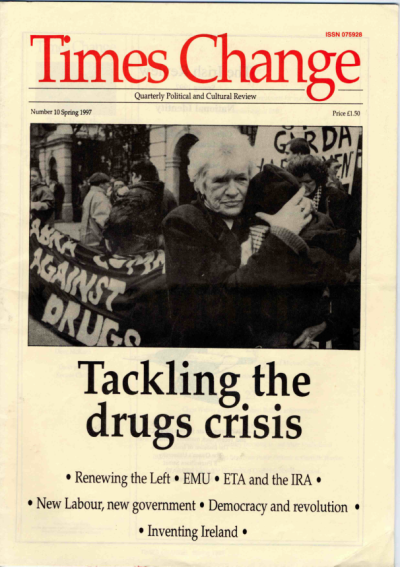
| Date: | 1997 |
|---|---|
| Organisation: | Democratic Left |
| Publication: | Times Change |
| Issue: | Number 10 Spring 1997 |
Contributors:
Info | Rogelio Alonso, Malcolm Barry, Paul Bew, Gavin Bowd, Gary Kent, Fred Lowe, Marc Mulholland, Conor Murphy, Henry Patterson, Pat Rabbitte, Chris Walker, David Wheatley, Robin Wilson |
| Type: | Publication Issue |
| View: | View Document |
| Discuss: | Comments on this document |
| Subjects: | European Monetary Union British Labour Party |
Please note: The Irish Left Archive is provided as a non-commercial historical resource, open to all, and has reproduced this document as an accessible digital reference. Copyright remains with its original authors. If used on other sites, we would appreciate a link back and reference to The Irish Left Archive, in addition to the original creators. For re-publication, commercial, or other uses, please contact the original owners. If documents provided to The Irish Left Archive have been created for or added to other online archives, please inform us so sources can be credited.
Commentary From The Cedar Lounge Revolution
8th July 2013
This edition of Times Change from Democratic Left has a number of oddly contemporary resonances. It leads with an article entitled ‘Tackling the Drugs Crisis’. However, it was written at a time leading towards the end of the Fine Gael/Labour/Democratic Left coalition formed in 1994 on foot of the disintegration of the Fianna Fáil/Labour coalition. It is therefore informative that the editorial concentrates on the prospects for a Fianna Fáil/Progressive Democrat coalition.
The list of questions asked are of interest at this remove:
Will the Pds accept the subservient role laid down for them by Mr. Ahern. For despite the attempts by the other Mr. Ahern to paper over the cracks, all the Pds are being offered is a walk-on role in a Fianna Fáil government. If, however, the Pds were to assert themselves and win a real say in government, would FF be happy to re-introduce water charges as advocated by Mary Harney? Would FF cut taxes as required by the Pds and, if so, what public spending cuts would it make? Would FF sell off profitable state companies like ACC, ICC, TSB and Aer Rianta? And would FF have the nerve to ask workers to be poor but happy?
It continues:
A Fianna Fáil/PD coalition would be inherently unstable.
It argues that:
The contrast with the outgoing government could not be greater. The three-party coalition…. Took office in difficult circumstances unprecedented in Irish political history, yet quickly got down to business. Prudence and decisiveness have been the hallmarks of the government’s management of the economy. Economic growth at 6 per cent in 1996 was well above the EU average while inflation at 1.6 per cent was at the lower end of the EU scale.
It makes a most interesting assertion in the following;
One lie needs to be nailed as the election draws near. Elements of FF together with SF continue to accuse the government for being responsible for the ‘breakdown’ of the IRA case-fire. This is nonsense. The IRA alone is responsible for ending its ‘complete cessation’, not the Brits, not the unionists, not ‘those bastards in power in Dublin’ (as leading republican Brian Keenan describes the Irish government. The ‘Irish Peace Initiative’ was blown to smithereens by its creators at Canary Wharf and it is now up to democratic parties, both nationalist and unionist to fashion a genuine peace process. Neither violence nor pan-nationalism have anything to contribute to such a process. The best contribution that the Republic can make is to continue the government’s even-handed approach’.
Given events that were to occur within the next twelve months the restatement of such a deeply sceptical, arguably even hostile, approach to the peace process is oddly telling.
It concludes:
The government is working well, the Republic is in good hands. The forthcoming general election will decide whether this remains the case or whether a shaky coalition, leaning to the far right and hopelessly divided on basic issues will be entrusted with the governance of the state.
Elsewhere there are a range of other articles with equally contemporary resonances including ones on the European Monetary Union.. Conor Murphy writes that:
As a small open economy, highly dependent on international trade, Ireland stands to benefit disproportionately from the lower transaction costs associated with EMU.
And he concludes:
On balance it is probably in Ireland’s best interest to take the EMU option with or without the UK.
Gary Kent has a piece on New Labour, approaching their own General Election landslide in Britain, and there’s a comparison between the IRA and ETA which concludes by arguing that the comparison made by the then RUC Chief Constable is fundamentally misconceived… ‘by leaving out the inevitability of a strong loyalist paramilitary response it puts the sort of optimistic gloss on Republican strategy which was characteristic of the analysis given by his predecessor Sir Hugh Annesley’.
There’s much else including a ‘What’s in store for the left article’ and a defence of democratic socialism under the line ‘Modern Myths and the need for democratic socialism’. And in passing interesting to note a reference on P.29 by Paul Bew to a text about to be published soon after that also has a contemporary resonance.
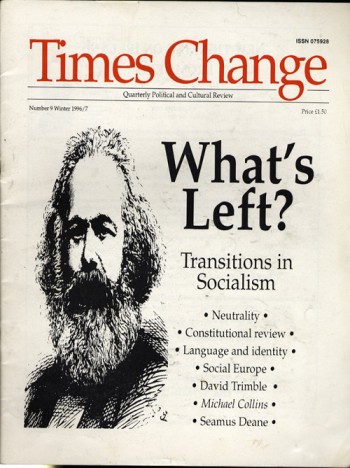
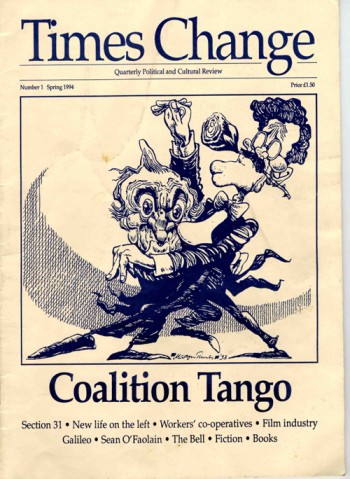
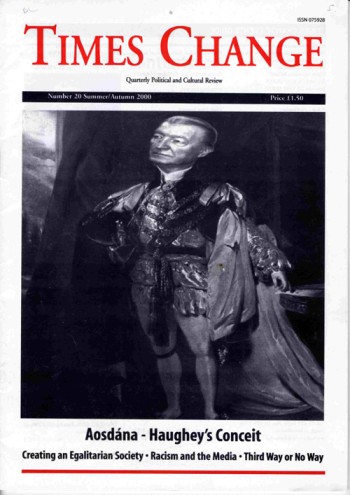
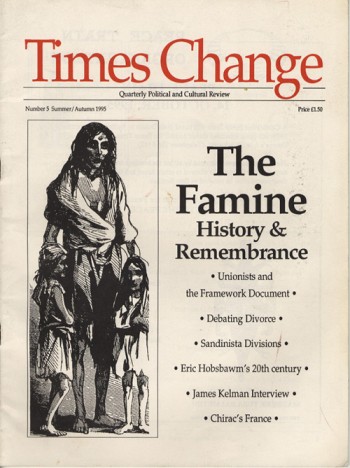
Comments
No Comments yet.
Add a Comment
Comments can be formatted in Markdown format . Use the toolbar to apply the correct syntax to your comment. The basic formats are:
**Bold text**
Bold text
_Italic text_
Italic text
[A link](http://www.example.com)
A link
You can join this discussion on The Cedar Lounge Revolution
By: Nessa Childers MEP (@NChildersMEP) Mon, 08 Jul 2013 17:29:28
The part on the peace process might have been written by De Rossa. Anti Republican tones to say the least
Reply on the CLR
By: Jim Monaghan Mon, 08 Jul 2013 17:43:02
“Neither violence nor pan-nationalism have anything to contribute to such a process. The best contribution that the Republic can make is to continue the government’s even-handed approach’.”
Implicit in this is an acceptance that the British are evenhanded and that the Loyalists are not responsible for anything.
Funny all of them would hand over Snowden.
Reply on the CLR
By: Ed Tue, 09 Jul 2013 10:39:46
The photo of a guy in a balaclava and sunglasses pointing a revolver at the camera that goes with the ETA/IRA article – wasn’t that also used in an earlier edition of Times Changes that we saw on CLR? Was it an editorial rule that all stories about the Provos had to be illustrated with that kind of image?
Anyway, the analysis of the North is really, really woeful; as well as the argument that Jim points out, you’ve got Rogelio Alonso claiming that Michael Collins was shot for accepting partition (every historian will tell you that the civil war was triggered primarily by the difference between the Republic and the Free State—oath, dominion status etc.—and not by partition) and Alonso and Henry Patterson claiming that the Provos didn’t like talking about parallels between their struggle and the Basque Country (for better or worse, they were always talking about their links with ETA and Batasuna). Hard to see any difference between the DL analysis put forward here and John Bruton’s line at the time (the quote Jim picks out above is classic Bruton).
Reply on the CLR
By: Joe Tue, 09 Jul 2013 14:59:26
In reply to Jim Monaghan.
Can’t see where either of those things are implicit in that statement, Jim.
Reply on the CLR
By: WorldbyStorm Tue, 09 Jul 2013 15:47:16
Have to agree with all of you, NC, JM and Ed.
To me this shows one significant problem in DL, and one of the primary reasons I left, and well in advance of coalition. It spoke about being even-handed but in practice it was anything but. It’s position was hardly one step apart from that of the British Government. At ever point it had to be dragged towards a recognition that matters were changing in the North. And even today I know people from that background, people who I deeply admire in all other respects, who still seem to find it difficult to understand how radically everything has shifted.
None of which meant that there was no room for scepticism about the process, for a variety of reasons, or motivations of those engaged, but as someone at an Annual Conference said, to a stony response, when the dogs in the street knew the IRA cessation was coming and DL kept acting publicly as if it was an impossibility on a level with – say – gravity reversing or some such it was ludicrous and opened the party to scorn. To my mind the game was up for it as a serious political or analytical operation, let alone as a party because it simply could not shrug off the constraints of a portion of its own legacy.
Reply on the CLR
By: Jim Monaghan Tue, 09 Jul 2013 16:51:52
In reply to Ed.
Could I add that during the Civil War there was agreement on both sides about the North. Michael Farrell’s book “Arming the Protestants” has detail on how Collins tried to assist Northern Nationalists and Republicans.
Reply on the CLR